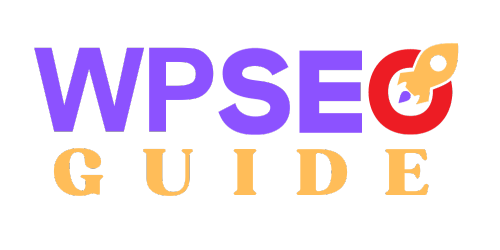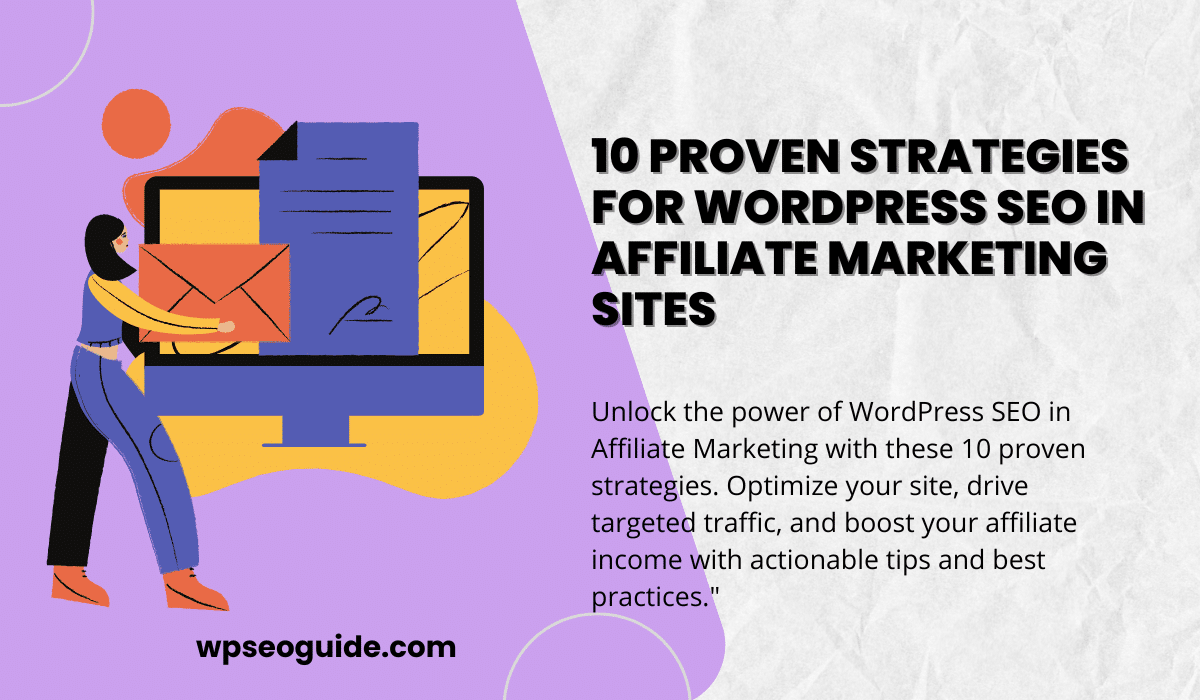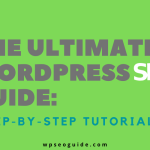Introduction
Affiliate marketing has become a powerful avenue for generating passive income, with countless individuals and businesses tapping into this model to monetize their online presence. As competition in the affiliate marketing space intensifies, simply having a WordPress site is no longer enough; you need to ensure that your site ranks well in search engines to attract organic traffic and maximize conversions. This is where WordPress SEO in Affiliate Marketing comes into play. By optimizing your WordPress site specifically for SEO, you can significantly increase your visibility in search engine results, driving more targeted traffic to your affiliate offers. In this guide, we’ll explore the essential SEO strategies and best practices specifically tailored for affiliate marketing sites, helping you boost your rankings, attract more visitors, and ultimately, increase your affiliate income.
I. Setting Up Your WordPress Site for SEO Success
A. Choosing the Right Theme
The foundation of a successful WordPress site lies in its theme. For affiliate marketing, choosing an SEO-friendly theme is crucial. An optimized theme not only ensures faster load times and a better user experience but also improves your site’s search engine rankings. Look for themes that are lightweight, responsive, and come with built-in schema markup. These features enhance your site’s speed and usability, which are critical factors in WordPress SEO in Affiliate Marketing. Additionally, a theme that supports easy customization allows you to structure your content in a way that aligns with your SEO strategy.
B. Essential SEO Plugins
To optimize your WordPress site for search engines, installing the right SEO plugins is essential. Plugins like Yoast SEO, Rank Math, or All in One SEO Pack are popular choices that can simplify the optimization process. These plugins help you manage on-page SEO elements like meta tags, XML sitemaps, and breadcrumbs, which are vital for search engine visibility. When configuring these plugins, focus on setting up key features such as keyword optimization, readability analysis, and social media integration. Properly configuring your SEO plugin will provide a strong foundation for WordPress SEO in Affiliate Marketing.
Read more about The Best WordPress SEO Plugins to Boost Your Website’s Performance
C. Site Structure and Navigation
A clear and logical site structure is crucial for both user experience and SEO. Organize your content into categories and subcategories that make sense to your visitors and search engines alike. A well-structured site allows search engines to crawl your content more efficiently, which can improve your rankings.
You can read about Optimizing WordPress Categories and Tags for SEO Success
Additionally, internal linking plays a significant role in guiding users through your content and distributing link equity across your site. Make sure to link related articles and use descriptive anchor text to improve both user experience and WordPress SEO in Affiliate Marketing.
II. Keyword Research for Affiliate Marketing
A. Understanding User Intent
Keyword research is the cornerstone of SEO, especially for affiliate marketing sites. It’s important to understand user intent when selecting keywords. User intent refers to the purpose behind a search query, and it typically falls into three categories: informational, transactional, and commercial. For affiliate sites, focusing on transactional and commercial keywords is key, as these indicate that the user is closer to making a purchase. However, don’t overlook informational keywords, as they can help you attract users earlier in the buying process, allowing you to guide them towards a purchase. Incorporating these insights into your WordPress SEO in Affiliate Marketing strategy can significantly enhance your site’s effectiveness.
B. Tools and Techniques for Keyword Research
To uncover the best keywords for your affiliate marketing site, you’ll need to use reliable keyword research tools like Mangools , Google Keyword Planner, Ahrefs, or SEMrush. These tools allow you to discover high-volume keywords, analyze competition, and identify long-tail keywords that are easier to rank for. Long-tail keywords, which are more specific and often less competitive, can drive highly targeted traffic to your site. Additionally, look for keyword opportunities related to product reviews, comparisons, and buyer guides, as these are often highly effective in affiliate marketing. Leveraging these tools is crucial for optimizing WordPress SEO in Affiliate Marketing.
C. Targeting Product-Focused Keywords
When it comes to affiliate marketing, targeting product-focused keywords is essential. These are keywords that potential buyers use when searching for reviews, comparisons, and detailed product information. By optimizing your content around these keywords, you can attract users who are ready to make a purchase. Create content that addresses the specific needs and questions of your audience, such as “best [product] for [need]” or “[product] vs. [competitor].” Incorporating these buyer-focused keywords into your content can significantly improve your chances of ranking in search engine results and driving conversions. This approach is a key component of effective WordPress SEO in Affiliate Marketing.
III. On-Page SEO for Affiliate Sites
A. Crafting Optimized Content
High-quality, optimized content is the backbone of successful on-page SEO. For affiliate sites, this means creating in-depth product reviews, comparisons, and guides that provide real value to your audience. Your content should be unique, informative, and tailored to the needs of your target audience. Use LSI (Latent Semantic Indexing) keywords, which are related terms and phrases, to enhance your content’s relevance and help search engines better understand its context. Remember, the more valuable and engaging your content, the more likely it is to rank well and attract visitors. This focus on quality content is integral to WordPress SEO in Affiliate Marketing.
B. Optimizing Meta Tags and Descriptions
Meta tags, including titles and descriptions, play a crucial role in on-page SEO. These elements are often the first thing users see in search engine results, so it’s important to make them compelling and relevant. Your meta titles should include your target keywords and accurately reflect the content of the page. Similarly, meta descriptions should be concise, informative, and include a call to action that encourages users to click through to your site. Well-optimized meta tags can improve your click-through rate (CTR) and help boost your search engine rankings. Effective meta tag optimization is a fundamental aspect of WordPress SEO in Affiliate Marketing.
C. Image Optimization
Images are an important part of affiliate marketing content, especially when showcasing products. However, large image files can slow down your site, negatively impacting SEO. To optimize your images, ensure they are compressed to reduce file size without sacrificing quality. Use descriptive file names and include alt text that incorporates relevant keywords. Alt text not only improves accessibility for visually impaired users but also provides additional context to search engines, which can help your images appear in search results. Optimizing images is a key component of WordPress SEO in Affiliate Marketing.
D. Improving Site Speed
Site speed is a critical factor in both SEO and user experience. A slow-loading site can lead to higher bounce rates and lower search engine rankings. To improve your site’s speed, consider implementing caching solutions, optimizing images, and using a content delivery network (CDN) to reduce load times. Regularly monitor your site’s performance using tools like Google PageSpeed Insights or GTmetrix, and address any issues that may be slowing down your site. A faster site not only ranks better but also provides a better experience for your visitors, increasing the likelihood of conversions. Enhancing site speed is essential for effective WordPress SEO in Affiliate Marketing.
IV. Off-Page SEO Strategies
A. Building Backlinks
Backlinks are a key component of off-page SEO and play a significant role in determining your site’s authority and ranking. For affiliate sites, acquiring high-quality backlinks from reputable sources can be challenging but is essential for improving your search engine rankings. Focus on building relationships with other bloggers, influencers, and industry websites to earn backlinks naturally. Guest posting, outreach campaigns, and creating link-worthy content are effective strategies for acquiring backlinks. The more high-quality backlinks you have, the more likely your site is to rank well in search results, making backlink building a crucial part of WordPress SEO in Affiliate Marketing.
B. Social Media Integration
Social media can be a powerful tool for boosting your affiliate site’s SEO. By sharing your content on social media platforms, you can drive traffic to your site and increase its visibility. Social signals, such as likes, shares, and comments, can also indirectly impact your search engine rankings. Engage with your audience on social media, encourage sharing, and build a community around your content. This not only helps with SEO but also creates a loyal following that is more likely to convert into affiliate sales. Leveraging social media effectively supports your WordPress SEO in Affiliate Marketing efforts.
C. Leveraging Influencer Marketing
Influencer marketing is another effective off-page SEO strategy for affiliate sites. Partnering with influencers in your niche can help you reach a larger audience and build credibility. Influencers can create content that promotes your affiliate products and links back to your site, providing valuable backlinks and driving targeted traffic. When approaching influencers, focus on building genuine relationships and offering value in return. Collaborations with influencers can lead to increased brand awareness, more backlinks, and ultimately, better SEO performance. This strategy complements WordPress SEO in Affiliate Marketing by enhancing your site’s authority and reach.
V. Technical SEO for WordPress Affiliate Sites
A. Ensuring Mobile Friendliness
With the majority of internet users accessing sites via mobile devices, ensuring that your WordPress site is mobile-friendly is crucial. Google’s mobile-first indexing means that the mobile version of your site is considered the primary version for ranking purposes. To ensure your site is mobile-friendly, choose a responsive theme that adapts to different screen sizes and test your site’s mobile compatibility using tools like Google’s Mobile-Friendly Test. A mobile-friendly site not only ranks better but also provides a seamless experience for users, leading to higher engagement and conversions. Ensuring mobile compatibility is a key aspect of WordPress SEO in Affiliate Marketing.
B. Implementing Schema Markup
Schema markup is a form of microdata that helps search engines understand the content of your site and display rich snippets in search results. For affiliate sites, implementing schema markup can enhance your search visibility and attract more clicks. Use schema to highlight product information, reviews, ratings, and more. There are several WordPress plugins that can help you easily add schema markup to your site. By providing search engines with more detailed information about your content, you can improve your chances of appearing in rich snippets and driving more traffic to your site. Effective use of schema markup is an important part of WordPress SEO in Affiliate Marketing.
C. Managing Site Security
Site security is a critical aspect of technical SEO that should not be overlooked. A secure site not only protects your users but also boosts your SEO. Google considers site security as a ranking factor, and sites that use HTTPS are more likely to rank higher in search
results. To secure your WordPress site, install an SSL certificate, keep your software and plugins updated, and use security plugins to protect against malware and hacking attempts. A secure site not only improves SEO but also builds trust with your visitors, making them more likely to convert. Prioritizing site security is essential for WordPress SEO in Affiliate Marketing.
VI. Monitoring and Measuring SEO Performance
A. Setting Up Google Analytics and Search Console
To effectively monitor and measure the performance of your SEO efforts, it’s essential to set up Google Analytics and Google Search Console. Google Analytics allows you to track various metrics such as traffic sources, user behavior, and conversions. With this data, you can understand how visitors interact with your site, which pages perform well, and where improvements are needed. Google Search Console provides insights into your site’s search performance, including keyword rankings, click-through rates (CTR), and indexing issues. By regularly reviewing these tools, you can gain valuable insights into WordPress SEO in Affiliate Marketing and identify areas for improvement.
B. Regular SEO Audits
Conducting regular SEO audits is crucial for maintaining and improving your WordPress affiliate site’s search engine performance. An SEO audit involves a comprehensive analysis of your site’s technical health, content quality, and backlink profile. Use tools like Screaming Frog, Ahrefs, or SEMrush to identify issues such as broken links, duplicate content, slow-loading pages, and crawl errors. An audit also helps you discover opportunities for optimization, such as updating old content, improving keyword targeting, and enhancing user experience. Regular audits ensure that your site remains optimized for search engines and continues to benefit from WordPress SEO in Affiliate Marketing.
C. Adjusting Strategy Based on Data
SEO is not a one-time task but an ongoing process that requires continuous monitoring and adjustments. By analyzing the data from Google Analytics, Google Search Console, and SEO audits, you can make informed decisions about your SEO strategy. For instance, if certain pages are underperforming, you might need to revise the content, improve keyword targeting, or enhance on-page optimization. Additionally, keep an eye on search engine algorithm updates, as they can impact your rankings. Adapting your strategy based on data and industry changes is key to maintaining and improving your site’s performance in WordPress SEO in Affiliate Marketing.
VII. Conclusion
A. Recap of Key Points
Throughout this guide, we’ve explored the essential strategies and best practices for optimizing your WordPress site for SEO, specifically tailored for affiliate marketing. From choosing the right theme and setting up SEO plugins to conducting keyword research and optimizing content, each step plays a crucial role in driving organic traffic to your site. We’ve also covered off-page SEO strategies like building backlinks and leveraging social media, as well as technical SEO practices to ensure your site is secure and mobile-friendly. Mastering WordPress SEO in Affiliate Marketing involves a comprehensive approach to both on-page and off-page optimization.
B. Encouragement to Take Action
SEO is a powerful tool that can significantly boost the success of your affiliate marketing site. However, it’s important to remember that SEO is a long-term investment that requires consistent effort and attention. By implementing the strategies outlined in this guide, you’ll be well on your way to improving your site’s search engine rankings, attracting more visitors, and increasing your affiliate income. Don’t hesitate to take action—start optimizing your site today and monitor your progress regularly to achieve the best results in WordPress SEO in Affiliate Marketing.
C. Final Tips for Long-Term Success
To achieve long-term success in affiliate marketing, stay up-to-date with the latest SEO trends and algorithm changes. Continuously produce high-quality, value-driven content that meets the needs of your audience. Build relationships with other bloggers and influencers in your niche to enhance your backlink profile and increase your site’s authority. Lastly, remember that SEO is an ongoing process; regularly review and adjust your strategy based on performance data to ensure your site remains competitive in the ever-evolving world of WordPress SEO in Affiliate Marketing.





